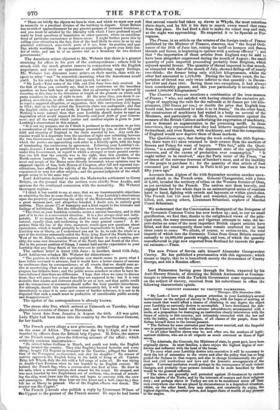The French papers allege a new grievance, the boarding of
a vessel on the coast of Africa. The vessel was the brig L'Aigle, and it was boarded by officers from the British brig Cygnet. M. Brice, the master of the French vessel, gives the following account of the affair ; which evidently contains inaccuracies 4, He arrived before Gallinas in March, and could not trade, the English having invaded the country. They (the English) burned factories and every thing ; bought 172 Negroes to transport to the Gambia ; pillaged the habitation of the Portuguese ex-Governor, and shot his daughter ! No canoes of natives appeared, the English behm in the habit of firing at all. Captain Brice left Whyda July the 6th witlia full cargo of palm oil. He was trying to double Cane Formosa when be was boarded by an English cruiser. He hoisted the French flag, when a cannon-shot was fired at him. He drew in his sails, when a second cannon-shot almost hit his vessel. He stopped, and was soon boarded by two Englishmen out of uniform, oho, instead of searching the ship, went down into the cabin, and began to converse with the crew and passengers. Having thus kept me two hours and a half, (says be,) they left me at liberty to proceed. One of the English officers was drunk. The cruiser was the Cygnet." The French journals also publish a reply by Lieutenant Wilson of the Cygnet to the protest of the French master. He says he had learnt that several vessels had taken up slaves at Whyda, the most notorious slave-depot, and he felt it his duty to search every vessel that came from that place. He had fired a shot to make the vessel stop and wait, as the night was approaching. He suspected it to be Spanish or Portuguese.
The Presse, in an article on the returns of the foreign trade of France published by the Minister of Finance, observes, that "the Royal Ordinance of the 26th of June last, raising the tariff on hempen and flaxen threads and linens, is beginning to operate with a serious efficacy "; and that "the importation of those articles from England may be said to have been altogether suppressed during the month of August ; the small quantity of yarn imported proceeding probably from Belgium, which enjoyed special favour. The quantity of thread imported in that month, as compared with that of the month of July, shows a falling-off of nearly two-thirds ; the former being only 413,349 kilogrammes, whilst the other had amounted to 1,319,600. Daring the last three years, the importation of thread was only twice inferior to that quantity ; in December 1840 and June 1841. Saving those two exceptions, it had always been considerably greater, and this year particularly it invariably exceeded 1,000,000 kilogrammes."
The Courrier Francais mentions a combination of the iron-masters of France ; "who, not satisfied with having obtained the exclusive privilege of supplying the rails for the railroads at 30 francs per 100 kilogrammes, (300 francs per ton,) or double the price that English iron would cost, have combined to raise it to 34 francs." On the other hand, the constructors of machinery had waited in a body on several of the Ministers, and particularly on M. Guizot, to remonstrate against the measure of the British Cabinet authorizing the exportation of machinery, and to demand an augmentation in the protecting tariffs. In those interviews, they represented that they had hitherto supplied Germany, Switzerland, and even Russia, with machinery, and that the competition of England would now deprive them of those markets.
The Quotidienne says, that during the week ending the 29th September, there were 611 oxen returned to their owners from the markets of Sceaux and Poissy for want of buyers. "This fact," adds the Quotidienne, "is a striking proof of the depressed state of the agricultural interests, and of the excess of production over consumption." " It ought rather to be received," says the Paris letter of the Times, "as evidence of the extreme dearness of butcher's meat, and of the inability of the people to purchase it ; for the quantity of that article of food consumed per head at present in Paris is 33 per cent less that it was fifty years ago."
Accounts from Algiers of the 25th September mention another unexpected check to the French arms. General Changarnier, with a force of 2,500, invaded the territory of tribes on the Western frontier of Oran, as yet unvisited by the French. The natives met them bravely, and engaged them for two whole days in an uninterrupted series of combats hand to hand, fighting with swords and bayonets or within pistol-shot. The French lost 150 men killed and wounded, including six officers killed, and, among others, Lieutenant Sebastiani, nephew of Marshal Count Sebastiani.


























 Previous page
Previous page